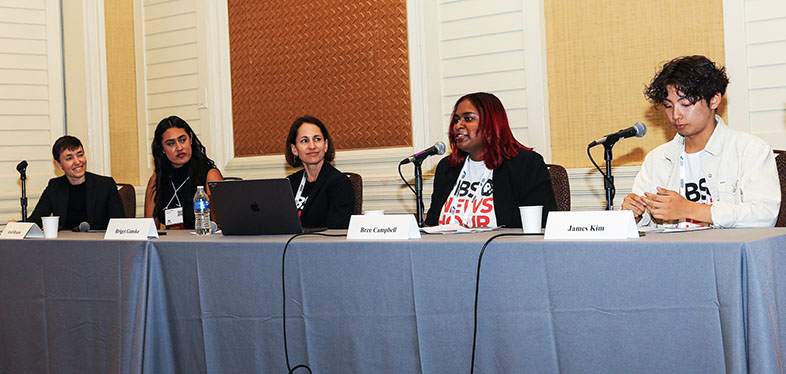
How to Center Student Voices in Mental Health Reporting
Experts explain the youth mental health crisis and how to accurately and fairly portray students in the media.
Photo credit: James Minichello of AASA for EWA

Experts explain the youth mental health crisis and how to accurately and fairly portray students in the media.
Photo credit: James Minichello of AASA for EWA
Students, both secondary and postsecondary, are processing an overwhelming abundance of information about complex issues, including social injustice and gun violence, which can lead to anxiety, depression and other mental health concerns. Journalists can cover the youth mental health crisis in a way that helps young people tell their stories.
Panelists at the 2024 EWA National Seminar in Las Vegas shared strategies for journalists and demonstrated some best practices themselves. Student journalists Bree Campbell and James Kim, co-hosts of season four of the podcast “On Our Minds,” interviewed panelists, who included:
Erickson-Schroth established the context for the mental health crisis and cited the Surgeon General’s 2021 report “Protecting Youth Mental Health,” which noted that “the challenges today’s generation of young people face are unprecedented and uniquely hard to navigate.”
Some of the factors that can lead to anxiety and depression, Erickson-Schroth noted, include:
Campbell asked Rosales, who has navigated experiences with depression, anxiety and PTSD, what she has observed about the coverage of teen mental health. Rosales, a sophomore at The University of Texas at San Antonio, has these suggestions for journalists covering mental health issues:
All panelists emphasized the importance of seeking out youth voices. While some young people may not be comfortable sharing their stories with journalists, many are. Panelists shared the following tips for finding youth to speak with:
After journalists find sources, it’s their responsibility to put those young people at ease. The panel shared some tips to help establish trust with young sources, many of whom may have never been interviewed.
Covering mental health requires sensitivity. Erickson-Schroth shared a few resources to help journalists prepare for interviews:
Your post will be on the website shortly.
We will get back to you shortly